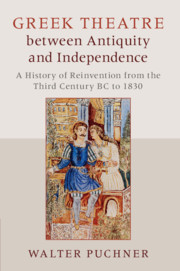Description
Greek Theatre between Antiquity and Independence
A History of Reinvention from the Third Century BC to 1830
Author: Puchner Walter
The first history of Greek theatre from Hellenistic times to the foundation of Modern Greece, marked by significant discontinuities.
Language: English
Subject for Greek Theatre between Antiquity and Independence:
Approximative price 35.47 €
In Print (Delivery period: 14 days).
Add to cart
Greek Theatre between Antiquity and Independence
Publication date: 07-2021
Support: Print on demand
Publication date: 07-2021
Support: Print on demand
Approximative price 114.03 €
In Print (Delivery period: 14 days).
Add to cart
Greek Theatre between Antiquity and Independence
Publication date: 06-2017
372 p. · 15.7x23.5 cm · Hardback
Publication date: 06-2017
372 p. · 15.7x23.5 cm · Hardback
Description
/li>Contents
/li>Biography
/li>
This first general history of Greek theatre from Hellenistic times to the foundation of the Modern Greek state in 1830 marks a radical departure from traditional methods of historiography. We like to think of history unfolding continuously, in an evolutionary form, but the story of Greek theatre is rather different. After traditional theatre ended in the sixth and seventh centuries, no traditional drama was written or performed on stage throughout the Greek-speaking world for centuries due to the Orthodox Church's hostile attitude toward spectacles. With the reinvention of theatre in Renaissance Italy, however, Greek theatre was revived in Crete under Venetian rule in the late sixteenth century. The following centuries saw the restoration of Greek theatre at various locations, albeit characterized by numerous ruptures and discontinuities in terms of geography, stylistics, thematic approaches and ideologies. These diverse developments were only 'normalized' with the establishment of the Greek nation state.
1. The long twilight of ancient theatre and drama; 2. Byzantium: high culture without theatre or dramatic literature; 3. Re-inventing theatre: Renaissance and Baroque Crete under Venetian rule (1500s–1600s); 4. Shaping a theatre tradition: the Ionian Islands from Venetian to British rule (1500s–1800s); 5. Jesuit theatre in Constantinople and the Archipelago (1600–1750); 6. Drama without performance: the Greek Enlightenment and Phanariot literature; 7. Rehearsing the Revolution: theatre as preparation for the uprising of 1821 (Bucharest, Jassy, Odessa); 8. Outlook: theatre in the nation-state versus theatre in the diaspora.
Walter Puchner is an Emeritus Professor in the Department of Theatre Studies at the University of Athens. He has published more than eighty books and about four hundred articles in academic journals. His research interests include the history of theatre in the Balkan peninsula, the comparative folklore and ethnography of the Mediterranean and Southeast Europe, Byzantine and Modern Greek Studies, as well as the theory of drama and theatre.
© 2024 LAVOISIER S.A.S.
These books may interest you

Theatre in Ancient Greek Society 160.25 €



